Location tracking technology, such as GPS trackers, has become an integral part of modern life. From navigation and logistics to personal safety, it offers numerous benefits.
However, like any technology, GPS tracking comes with its own set of challenges, some of which can have significant implications.
Understanding these issues is essential for making informed decisions about when and how to use location tracking technology responsibly and effectively.
In this article, we’ll explore the most common problems associated with location tracking, delve into the technical limitations, and highlight proactive solutions to enhance your GPS tracking experience.
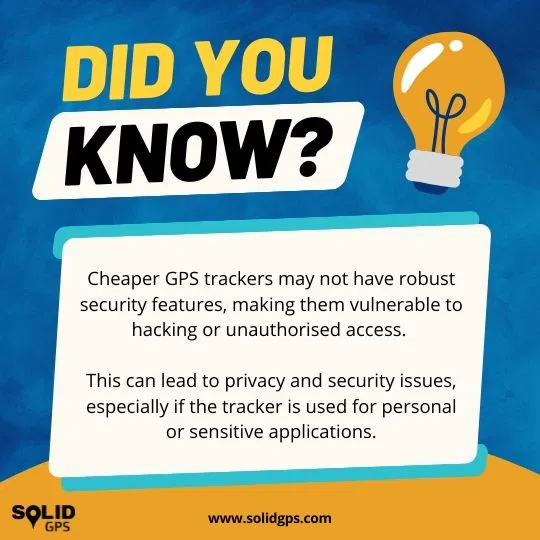
1. Signal Interference and Accuracy Challenges
GPS systems rely on signals from satellites to determine location. However, these signals are vulnerable to interference from physical obstructions like buildings, trees, and tunnels.
Weather conditions, such as heavy rain or dense fog, can also weaken GPS signals, resulting in location inaccuracies.
These inaccuracies can cause significant issues in critical scenarios such as navigation, emergency response, or asset management.
For example, “GPS drift”—where location data bounces inaccurately—can occur when signals reflect off nearby surfaces, creating errors.
To address this, advanced GPS technologies are integrating additional data sources such as Wi-Fi and Bluetooth to improve accuracy.
Solutions like IMU (Inertial Measurement Unit) sensor fusion in modern SDKs can even predict movements when GPS signals are weak, making them indispensable for high-precision applications.
2. High Battery Consumption
One of the most common complaints about GPS trackers is their impact on battery life.
GPS devices continuously communicate with satellites and process data, which can drain a device’s battery quickly.
This is particularly problematic for mobile users who need to balance location tracking with conserving power for other critical tasks. Manufacturers and developers are addressing this challenge with energy-efficient tracking algorithms and smarter hardware.
For instance, native Android and iOS APIs now provide adjustable tracking modes that allow users to balance accuracy with energy consumption.
Choosing a GPS tracker with optimised power settings or extended battery life can help users get the most out of their devices without constant recharging.
3. Hardware Failures and Outdated Technology
Older GPS devices or cheap tracking systems often lack the latest features necessary for reliable tracking.
These devices may struggle to maintain a strong GPS signal or be prone to hardware failures like blown fuses, poor power connectivity, or incorrect configurations (e.g., time zones or COM ports).
Without proper maintenance, even high-end trackers may become unreliable. Updating to newer hardware and ensuring regular maintenance are critical.
Additionally, using trackers with advanced firmware ensures compatibility with updated maps and system protocols, preventing issues like missing roads or inaccurate directions.
4. Privacy Concerns
As GPS tracking technology becomes more pervasive, privacy concerns are growing. Users are increasingly worried about how their location data is collected, stored, and used.
Unauthorised access to sensitive location data can expose individuals to privacy breaches or even security threats.
Addressing these concerns requires transparency and robust security measures. Businesses must implement clear opt-in processes and explain why location data is being collected.
They should also comply with privacy regulations, such as GDPR, and ensure data is encrypted to prevent unauthorised access.
Ethical considerations are equally important. Tracking someone’s movements without their consent can raise serious legal and moral issues.
By prioritising user consent and maintaining secure data practices, companies can build trust while offering the benefits of location-based services.
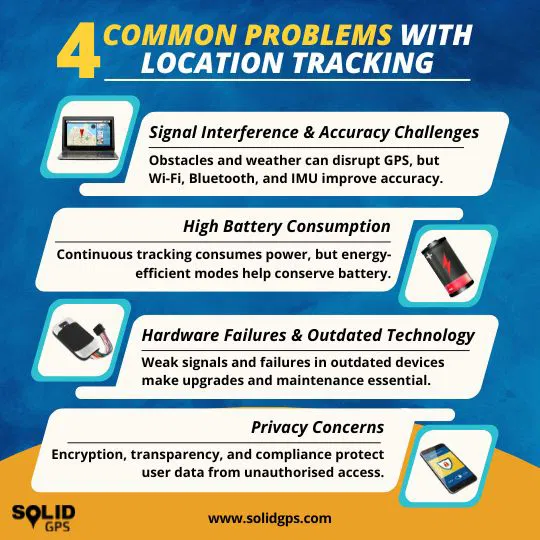
The Effects of Encountering Problems with Location Tracking
Issues with GPS tracking can have wide-ranging consequences, from minor inconveniences to severe impacts.
Here are some of the key areas affected:
- Delayed Emergency Response
Inaccurate location data can delay emergency responders, jeopardising lives in critical situations. For instance, imprecise tracking during a rescue operation can lead to wasted time and resources.
- User Experience and Trust Concerns
Inaccurate or unreliable tracking frustrates users and can erode trust in location-based services. When users doubt the technology, they may hesitate to share their location data, undermining the service’s value.
- Financial and Resource Wastage
For businesses, inaccuracies in GPS tracking can lead to costly errors, such as misrouted deliveries or inefficient operations. Troubleshooting and repairing these issues further strain resources.
- Psychological and Legal Implications
On a personal level, users may experience anxiety or stress if they feel monitored or uncertain about how their data is being used. Legally, inaccurate location data used as evidence in court can lead to wrongful convictions or disputes, highlighting the importance of accurate tracking systems.
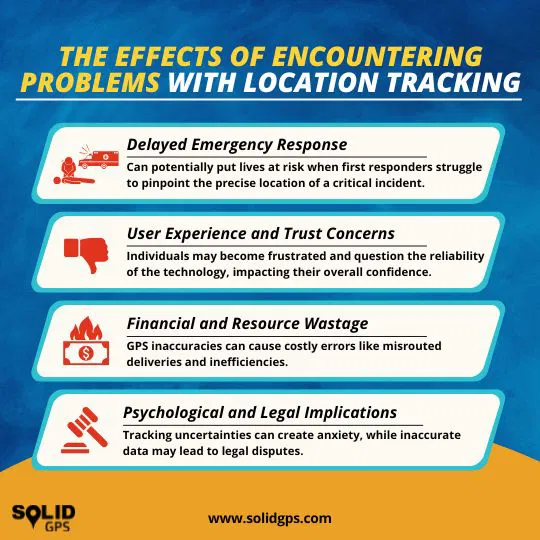
Proactive Solutions to GPS Tracking Challenges
Addressing GPS tracking issues requires a combination of reliable hardware, regular maintenance, and user awareness.
By implementing these solutions, users can enhance accuracy, efficiency, and overall performance.
- Regular Maintenance and Updates
To ensure accurate tracking, devices must be kept up to date with the latest software and firmware. This prevents issues like outdated maps or missing roads.
- Choosing Reliable GPS Trackers
Investing in high-quality GPS trackers, such as those with advanced tamper-detection and geofence management features, can address many common issues. Reliable devices with extended battery life and modern features provide a better user experience and reduce the need for troubleshooting.
- Utilising Advanced SDKs
Developers can leverage advanced SDKs (Software Development Kits) to enhance the performance of their GPS solutions. Features like IMU sensor fusion, Wi-Fi triangulation, and adaptive power settings ensure better accuracy and energy efficiency.
- User Education
Educating users on how to optimise their tracking devices is essential. Simple steps like calibrating settings, avoiding signal-blocking environments, and monitoring battery usage can significantly improve performance.
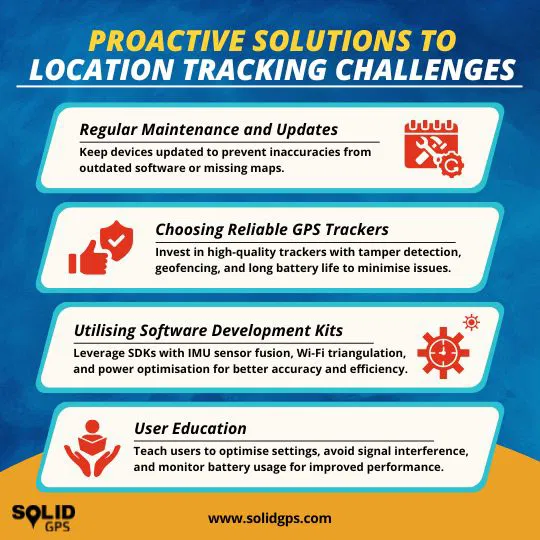
Why a Solid GPS Tracker is the Solution to Your Location Tracking Problems?
A Solid GPS tracker stands out as the ultimate solution for overcoming location tracking challenges.
By offering unmatched precision and reliability, it eliminates frustrations linked to inaccurate or outdated systems.
Its extended battery life ensures long-term usability, while tamper-detection and geofence management features add extra layers of security and efficiency.
In a world where accurate location data is crucial for navigation, logistics, and personal safety, the Solid GPS tracker provides dependable tracking capabilities for a wide range of applications.
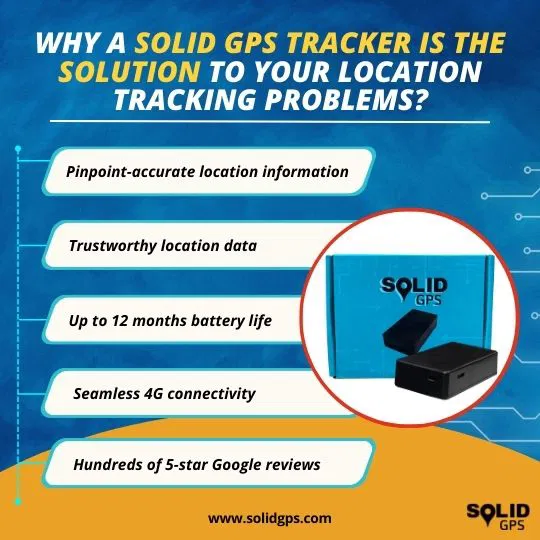
Conclusion
Location tracking technology has revolutionised navigation, logistics management, and personal safety. However, challenges such as signal interference, geofence errors, privacy concerns, and tampering risks can impact its effectiveness.
By proactively addressing these issues and investing in reliable GPS trackers, users can fully harness the benefits of this powerful technology.
To help you make the most of your GPS tracking experience, we’ve included an FAQ section, offering insights on troubleshooting and ensuring data security.

